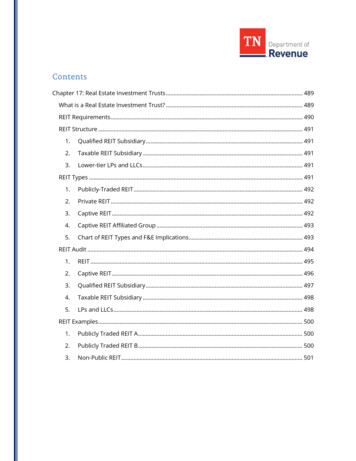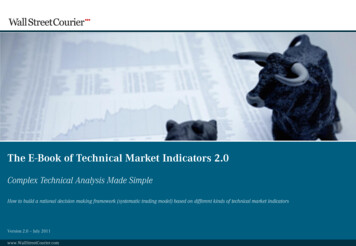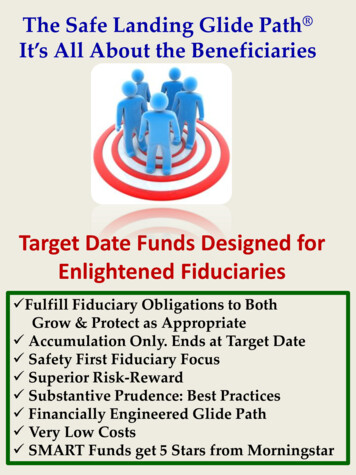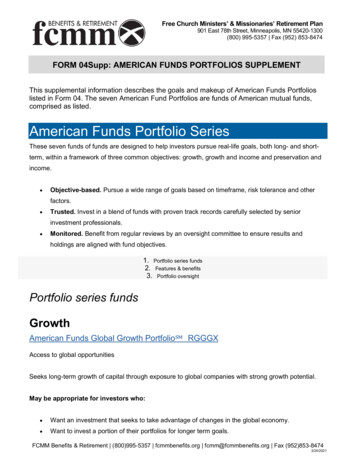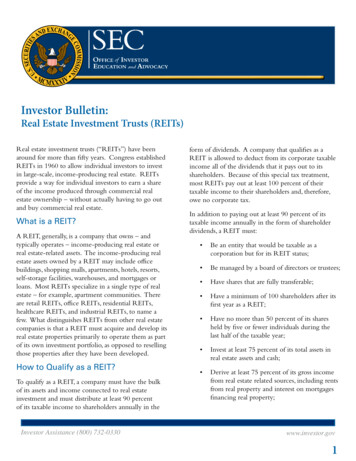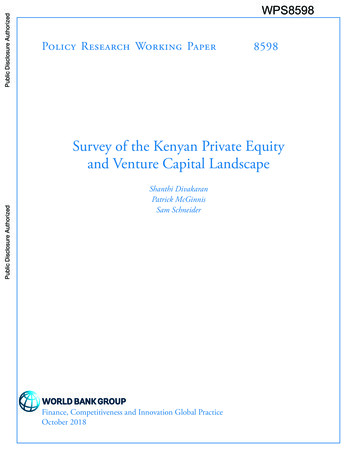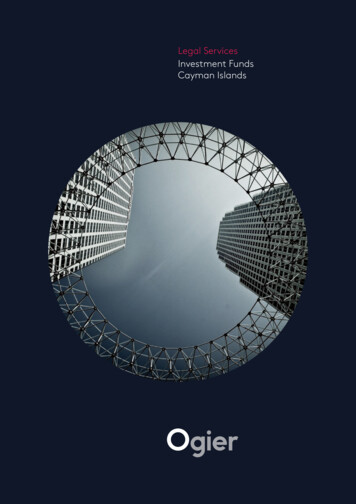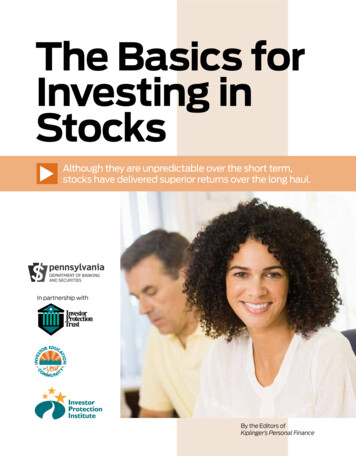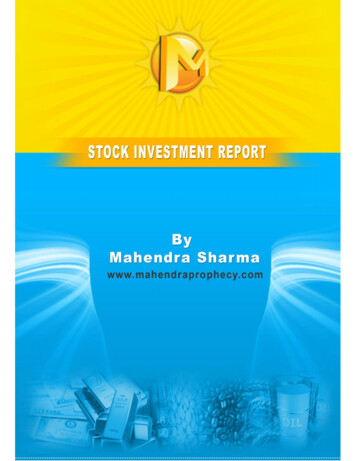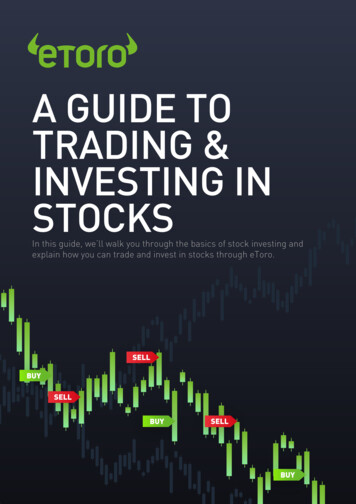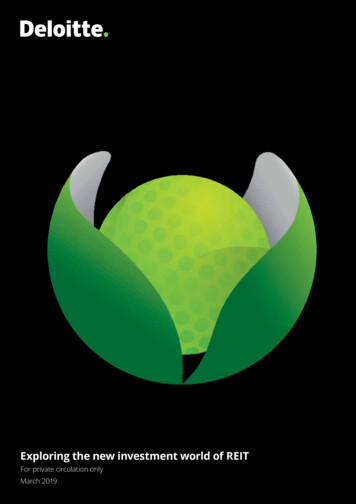
Transcription
STOC KS F U NDS I N VESTM E N T T RUSTS P E N S I O N S A N D SAV I NGSSHARESVOL 19 / ISSUE 03 / 26 JANUARY 2017 / 4.49WH YV O D A F O NEIS A TOPINVESTMENTWE MAKE INVESTING EASIERWHERENE X T FOR BTA F T ER 5 3 0MS H O C K?orWHAT TO DO WHENA PRICE FALLSMarkets start todoubt Trump est deals forByour cashAssets to beatinflation How to cut yourpension tax bill
BespokeTailor Next Generation, our multiaward-winning platform,* to suit yourtrading styleSave up to five unique platform layouts and customise charts, technicalindicators, newsfeeds, watchlists and other trading tools. You can even linkmodules to create a trading dashboard that’s truly unique to you.Switch today at cmcmarkets.co.ukSpread betting CFDs FX BinariesSpread betting and CFD trading can result in losses that exceedyour deposits. All trading involves risk.* Best Trading Platform Features among spreadbetters, CFD and FX traders in the InvestmentTrends 2016 UK Leveraged Trading Report.CMC Moneyweek Bespoke 297x210 V5.indd 108/11/2016 12:58
EDITOR’S VIEWStock market scandalheads to the cinemaBre-X investment fraud is the inspiration behind new filmAstock market scandal is headingfor the silver screen next monthin the UK. If you’ve any interestin mining stocks, I’d highly recommendyou check out the film.Elements of its story may soundfamiliar to investors who’ve dabbled innatural resources companies or listenedto presentations by miners insistingthey’ve found the biggest discovery formany years. I will certainly be making atrip to the cinema to see it.INSPIRED BY REAL EVENTSMatthew McConaughey’s movie Gold is inspired bythe Bre-X investment fraud.Two decades ago, a Toronto-listed small capmining business claimed it had found an enormousgold deposit.Bre-X Minerals was a struggling business until itbought a property in the Borneo jungle. It declaredthe project was outstandingand the estimated amountof gold in the ground grewfrom 2m ounces to 70mounces in less than fiveyears. At that point thecompany was valued atmorethan 4bn.In reality the goldwasn’t there and thefraud was uncoveredin 1997.One of the company’sgeologists committedsuicide and aprospective miningpartner subsequentlysaid its analysis ofBre-X’s drill coresamples didn’t findany significant amounts of gold. Anindependent company found some ofthe samples to include shavings fromgold jewellery.Bre-X went bust and investors losteverything.The Canadian 43-101 reportingstandard was created in response tothis fraud to protect investors fromunsubstantiated mineral projectdisclosures. It is similar to the JORCreporting standard used by UK-quotedmining companies.HYPE MERCHANTSSadly neither 43-101 nor JORC will protect youfrom losing money with mining stocks. The industryis still tainted by some small cap promoters eagerto over-hype projects, particularly those withoutenough information to produce a 43-101 or JORCcompliant resource statement.I’ve lost count of the hot air being producedby promoters in the 11years I’ve been writingabout the mining sector.A promoter can givea compelling yarn, butyou need to base yourinvestment decisions onhard facts – be it metalgrade, the ability to extracteconomically, geopoliticalrisk, accessibility andso on.Gold will no doubt be anentertaining few hours atthe cinema; just remembernot to get swept away bythe investment excitementoffered by a mining companyuntil you see the evidencebacking up their claims. (DC)26 January 2017 SHARES 3
ContentsINTERACTIVEPAGESCLICK ON PAGESNUMBERS TO JUMPTO THE RELEVANTSTORY26 January 201703 Stock market scandalheads to the cinema14 Funds to protectagainst rising inflation06 BT’s 530m Italianblack hole18 The market has gotit wrong on HowdenJoinery 19 Building the case forIbstock20 We update our tips onIMIMobile andAmerisur Resources36 Is the ‘Trump Bump’for investors about toend?07 Top picks in theleisure sector38 Dial up Vodafonedividends08 Photo-Me blinded bymobile threat toearnings10 Where to save yourcash for unexpectedevents11 Beware the pensiontax taper trap12 Absolute return fundsare not living up totheir name40 You need WatkinJones in your portfolio24 This investment trustmay not stay cheapfor long26 Can Germany repeat2016’s economicsuccess?DISCLAIMERIMPORTANTShares publishes information and ideas which are of interest to investors. Itdoes not provide advice in relation to investments or any other financial matters.Comments published in Shares must not be relied upon by readers when theymake their investment decisions. Investors who require advice should consult aproperly qualified independent adviser. Shares, its staff and AJ Bell Media Limiteddo not, under any circumstances, accept liability for losses suffered by readers asa result of their investment decisions.Members of staff of Shares may hold shares in companies mentioned in themagazine. This could create a conflict of interests. Where such a conflict exists itwill be disclosed. Shares adheres to a strict code of conduct for reporters, asset out below.1. In keeping with the existing practice, reporters who intend to write about any4 SHARES 26 January 201728 Buy or sell? What todo when a price falls41 Why we like MySaledespite expensivevaluation42 The UK’s little-knowncommunicationsgemssecurities, derivatives or positions with spread betting organisations that theyhave an interest in should first clear their writing with the editor. If the editoragrees that the reporter can write about the interest, it should be disclosed toreaders at the end of the story. Holdings by third parties including families, trusts,self-select pension funds, self select ISAs and PEPs and nominee accounts areincluded in such interests.2. Reporters will inform the editor on any occasion that they transact shares,derivatives or spread betting positions. This will overcome situations when theinterests they are considering might conflict with reports by other writers in themagazine. This notification should be confirmed by e-mail.3. Reporters are required to hold a full personal interest register. The whereaboutsof this register should be revealed to the editor.4. A reporter should not have made a transaction of shares, derivatives or spreadbetting positions for seven working days before the publication of an article thatmentions such interest. Reporters who have an interest in a company they havewritten about should not transact the shares within seven working days after theon-sale date of the magazine.
For people whoread the markets.Not play them.Competitive spreads & commissionsFX Spreads from 0.5 pointsExecuting quality trades for over 30 yearsOpen an account todayTrade indices, currencies, shares and commodities with a Spread Bettingor CFD accountLosses can exceed depositsAuthorised and regulated by the Financial Conduct Authority.Job No: 327121Client: MVC Communications LtdCampaign: City IndexProof No: 01Publication: Shares MagazineInsertion Date: 26/01/2017
BIG NEWSBT’s 530m Italianblack holeHuge accounting malpractice discovery smashes profitsThe market is in shock after telecoms giantBT (BT.A) admitted the cost of dodgyaccounting at its Italian business is far biggerthan first thought (24 Jan).The group’s own investigation has uncovered anaccounting malpractice bill of around 530m, morethan three-and-a-half times the 145m initiallyforecast.This huge write-down, plus slowing public sectorand international work, means a substantial hitto revenues, profits and cash flow this year to 31March 2017, which will spill over into the nextfinancial year too.This year’s earnings before interest, tax,depreciation and amortisation (EBITDA) will comein around 300m lower than expected, at about 7.6bn, with roughly 175m due to the Italy fiasco.It gets worse, with an estimated 600m to 700mhit to previously anticipated free cash flow of 3.2bn, and a rough 500m hit next year.While the Italian operations are relatively small,accounting scandals go down particularly badlywith investors. The share price collapsed by nearly18% in trading on 24 January, plunging to 314.95p,its lowest point since May 2013.That implies that nearly 7bn has been swipedoff the market cap at a stroke, as shareholders alsosweat over the impact on BT’s bonds and 14.2bnpension deficit. BT has at least confirmed that it stillexpects to grow dividend per share by 10% boththis year and next.Some analysts speculate that the bleaky-wordedwarning has an ulterior motive designed toshow BT’s weakest possible hand as it continuesnegotiations with watchdog Ofcom over the futureof its Openreach infrastructure network. (SF)Don’t expect another bumper yearfor special dividendsNew report suggest companies won’t be as generous in 2017 as last yearTHE AMOUNT OF money paid inspecial dividends to UK investorscould fall in 2017, according toCapita Asset Services’ latest studyof shareholder rewards.Companies on the UK stockmarket more than doubled theamount of money paid in specialdividends in 2016 to 6.1bn. Thatis the second largest haul onrecord. Capita believes it will behard to repeat this feat in 2017.Special dividends are oneoff payments by businesseswhich have no other requirementfor cash that’s built up on6 SHARES 26 January 2017their balance sheet. They areunpredictable in nature andshould not be confused with‘ordinary’ dividends paidby companies typically everysix months.Halfords (HFD) is the latestcompany to announce a specialdividend, saying it will pay 10pper share in February given it hasspare cash and no plans to makeacquisitions.InterContinental Hotels (IHG),GlaxoSmithKline (GSK), ITV (ITV)and Prudential (PRU) are amongthe large cap companies whichpaid special dividends in 2016.The rewards tend to beassociated with companies thathave low capital expenditurerequirements, such as insurers.Special dividends can alsooccur when a company sells amajor asset. An example beingCarr’s (CARR) last year when itsold its flour milling arm.National Grid (NG.) is toreturn a large chunk of cashto shareholders in the secondquarter of 2017 after selling a61% stake in its gas distributionnetworks. (DC)
BIG NEWSNEWSBIGLeisure industry offersrich pickingsEarnings upgrade scope and M&A upside are reasons to like the sectorWhile sterling depreciation following thevote for Brexit will hit consumers in thepocket, it may also fatten the wallets ofsavvy leisure sector investors. Broker CanaccordGenuity for one believes the online gaming subsector remains ripe for further consolidation.SPORTING LOSSESKey constituent Paddy Power Betfair (PPB)shrugged off adverse sports results in late 2016 andassured investors (23 Jan) full year earnings willcome in at the mid-point of its previously guided 390m to 405m EBITDA range.The sports betting and gaming group formedthrough February 2016’s mega-merger said thatsince its third quarter update, it had continued tosee good sportsbook staking growth, although itwas hit by the US election result and unfavourablefootball scores.‘Betfair’s sportsbook, Paddy Power’s sportsbookand the over-the-counter sportsbooks in PaddyPower’s 600-plus shops all lost money on footballduring the month of December,’ says Davy, albeitsticking with its ‘outperform’ rating on the shares.The broker seems confident 2017 earningsforecasts will have to be revised upwards as theyear progresses. It notes prospects are good inEurope and Australia, where the Sportsbet arm‘exited the year with good top-line momentum’.POTENTIAL TARGETSCanaccord Genuity highlights 888 (888) as a primeleisure sector bid target.Online gaming is an industry with significanteconomies of scale which is currently facing risingregulatory and marketing costs; this fact lies behindthe recent Paddy Power/Betfair, Ladbrokes/Coral,GVC/bwin and Amaya/PokerStars mergers.‘888 looks the most compelling target, in ourview – unusually, it owns its own technology(outside Sportsbook), meaning it has lowermargins but conversely offers greater potential costsynergies to acquirers,’ says Canaccord.‘It also boasts a best-in-class CRM platform andonline marketing capabilities which could drivepotential revenue synergies.’ The broker reckonsLadbrokes Coral (LCL), William Hill (WMH) andRank (RNK) are potential suitors, while ‘a tie-upwith GVC (GVC) would also generate materialsynergies.’M&B VULNERABLE?Canaccord also believes pubs-to-restaurantbusiness Mitchells & Butlers (MAB) looksvulnerable to a bid, mindful that UK tax exile JoeLewis owns 26.6% and made a failed takeover in2011 at the 230p level.‘He may be tempted to bid again, given thepersistent weakness of the share price. It’s alsopossible that, following Heineken’s recent decisionto bulk up its pub estate, other brewers could lookto M&B,’ says Canaccord. (JC)26 January 2017 SHARES 7
BIG NEWSStadium mulls payout hike 5m extra funding could fuel growth ambitions and higher dividendElectronics manufacturer Stadium (SDM:AIM)could be set to lift 2017’s forecast dividendpayout of 3p per share by as much as a third.At the root of the move is a tidying up of itsbalance sheet to release around 5m of fundingcurrently tied up in a share premium account.Stadium says this process ‘would createadditional distributable reserves which wouldprovide the company with further flexibility inrelation to the payment of future dividends.’However, CEO Charlie Peppiatt has told Sharesthat some of the funds released would likely beused to continue the company’s expansion intohigher margin growth markets, such as powersupply, wireless components and human-machineinterface technology.Stadium has already won the backing ofshareholders, who voted in favour at a meeting on19 January. Next the company must apply to theHigh Court for permission, although that appears tobe little more than a box-ticking exercise.Assuming this proves the case, a dividendincrease to a 4p per share looks well withinStadium’s funding capacity, in our view.It would imply a dividend cash commitment of alittle more than 1m a year, comfortably coveredby operating cash flows.SHARES SAYS: The share price has already started moving, risingfrom 84p to 95p this year. A 4p dividend would equateto 4.2% yield based on the latest share price. (SF)BROKER SAYS0 00Photo-Me blinded by mobile threat to earningsAny hit to profit unlikely to be as bad as implied by share price collapseONE FIFTH OF Photo-MeInternational’s (PHTM) market valuewas wiped off at the start of theweek following news that the HomeOffice will accept photos taken onmobile phones for passports.Investors assumed this wouldrender Photo-Me’s UK fleet of photobooths as worthless. The companyreplied by saying it believedaccepting photos from mobilephones for official documentswas ‘incompatible with developingsecurity requirements’.8 SHARES 26 January 2017Analyst Simon Davies ofinvestment bank Canaccord Genuityremains a fan of Photo-Me, sayingshare price weakness is a buyingopportunity.‘The UK is trialling potentialchanges to passport applications,potentially allowing adults agedover 26 to use mobile photos torenew their passport, but only if thephotos are of the requisite standard(set by ICAO and ISO), somethingwhich is very hard to achieve,’ hecomments.Photo-Me’s UK photo boothsonly account for an estimated5% of group profit, so a declinein income from this area of thebusiness wouldn’t have a majorimpact.Davies notes Europe is shiftingtowards more sophisticatedsecurity photos including 3Dimaging and iris scanning.Therefore he believes there is achance the UK Passport Officecould rethink its stance towardspictures from phones. (DC)
TNU1720CO2/ISD 2% 10/RD O ILBI T TY- UP UNRLEEABLLA1AIAVAre you still overlooking‘the most successful growthmarket in the world’?The Alternative Investment Market (AIM) ispopulated with young and dynamic Britishbusinesses. Through Hargreave Hale AIMVCTs new 20 million share offer, investorswho accept the high level of risk have theopportunity to tap the potential of thesesmaller company enterprises within ahighly tax efficient* scheme wherequalifying conditions are met.Investors should note that in orderto gain the full tax benefits* theinvestments need to be heldfor 5 years.Investors should read theprospectus before investing.www.hargreaveaimvcts.co.ukIMPORTANT INFORMATION FOR INVESTORSu The VCTs invest in small, high risk companies that place an investor’s capital at risk. These companies may have volatile share pricesand the investments may be difficult to realise. u AIM is less heavily regulated by than the LSE main market. u VCT shares can be illiquid.The share price is unlikely to reflect the NAV per share and is heavily influenced by the buy-back policy, which is non-binding and at thediscretion of the boards of directors. u Dividend distributions are subject to performance and other factors and cannot be guaranteed.u Changes in legislation may adversely affect the companies’ status as VCTs and their ability to meet the investment objectives and/or reduce the level of achievable return. * The VCTs may breach the VCT legislation and lose their VCT status and applicable tax reliefs.u The 30% income tax relief is limited to the amount of tax paid by the investor and may be withdrawn if an investor holds their VCTshares for less than 5 years. u Tax benefits may be subject to future changes.1Source. London Stock ExchangeThis financial promotion is issued by Hargreave Hale Limited. Hargreave Hale is incorporated in England and Wales. Company Number 3146580.Registered office: Talisman House, Boardmans Way, Blackpool FY4 5FY. Authorised and regulated by the Financial Conduct Authority (209741),Member and SETS participant of the London Stock Exchange and the Wealth Managers Association.(1856) Shares Mag Ad.indd 423/01/2017 14:52
MONEY MATTERSHelping you with personal finance issuesWhere to save your cashfor unexpected eventsWe look at some of the best rates available on Cash ISAsEvery person should holdsome cash alongsideinvestments to guardagainst unexpected expensesor periods of unemployment.Cash can also be useful formaking investments whenopportunities in the stockmarket arise.Most investment platformspay very small levels of intereston cash balances held in a Stocks& Shares ISA, if at all. Thereforeyou may wish to keep any partof the cash not destined forthe stock market in a bank orbuilding society account offeringhigher interest with the view thatyou may not need the money forsome time.Cash accounts range fromeasy access to ones that chargea penalty if you want to accessthe money before a certain termis up.As we’re talking aboutpreparing for unexpectedscenarios, you might be betteroff sticking with easy accessCash ISAs that do not imposeany penalty on the first fewwithdrawals each year.We’ve looked at some ofthe best buy products on themarket at present, ignoringaccounts which require you tobe an existing customer or meetother specific criteria such asgeographic location.NS&I has the highest level ofinterest at 1%, closely followedby Virgin Money at 0.95%.Admittedly these aren’t verygenerous; but they are betterthan nothing. (TS)Cash machine fee debate pointsto contactless payment dangerA shift in consumer spending habits could lead to debt bubbleLAST WEEK’S NEWS about possiblefees for withdrawing cash frommachines in the Link ATM networkputs the spotlight back on the UK’scash usage.Many people were outraged at thethought of having fewer free-to-usecash machines in the UK. Yet thepublic reaction was divided.Half were angry; the rest saidit wasn’t relevant given howmany people use cards to pay foreverything in their life.Contactless cards, in particular,are changing our paying habits withalarming pace. A quarter of all cardpayments are now contactless,according to new figures from The10 SHARES 26 January 2017UK Cards Association. You can payfor something under 30 withouthaving to type in your PIN number.The shift in spending methodcould benefit pubs, small ticketretailers and leisure firms.Previously you’d judge whetherto buy something under 30 bywhether you’d had any sparechange or a few tenners in yourpocket. Now many people tap theircard on the machine with littlethought to how much is in theiraccount. Pay now, worry later.Is this an accident waiting tohappen?The rise in contactless cardpayments could result in higherconsumer debt, in our opinion. Itcould see people dip into moneythey’d normally use to buygroceries or even regular savingsand potentially leave them in apickle when the important billsneed settling. (DC)
MONEY MATTERSBeware the pension taxtaper trapWe look at why you should think very seriously about enhancing yourretirement savingsThe Government has hadan insatiable appetite fortinkering with pensiontax perks.George Osborne when he waschancellor continually hackedaway at the lifetime allowance –the limit the Government sets onhow much you can have savedin all your pensions. It went from 1.8m to 1m.He also oversaw two reductionsin the annual allowance – theamount you can save in a pensiontax-free each year. The allowancecurrently stands at 40,000 formost people.CUTS CUTS CUTSThere are two scenarios in whichyour annual allowance will belower than 40,000.A separate Money PurchaseAnnual Allowance (MPAA) wasintroduced by the Governmentto stop savers ‘recycling’ cashthrough their pension.The MPAA means anyonewho has accessed their pensionflexibly from age 55 is subject toa reduced annual allowance of 10,000.The Government has proposedreducing thisallowance to just 4,000 fromApril this year.However, itis the devilishlycomplexpensions tax ‘taper’ – a thirdlimit on annual pension saving – Iwant to focus on here.WILL YOU BE AFFECTED BYTHE TAPER?Do you have total ‘adjustedincome’ – which includes allincome and employer pensioncontributions – of 150,000or more? Are you planningon paying into your pensionbetween now and the end of thetax year in April? If so, the tapermight affect you.Under rules set out byGovernment, for every 2 ofadjusted income above 150,000your annual allowance will bereduced by 1, right down to aminimum of 10,000 for anyonewith adjusted income above 210,000.Any contributions over yourannual allowance will be hit witha tax charge – unless you have‘carry forward’ available fromprevious years.Carry forward rules allow youto use any unused allowancesfrom the previous three tax yearsto minimise your tax bill.It’s worth noting that if your‘threshold income’ –that is your totalincome less anypersonal pensioncontributions– is less than 110,000, you willnot normally be subjectto the tapered annual allowance.Talk to a regulated financialadviser if you are unsure aboutyour personal situation.HOW THIS WORKSIN PRACTICEGeorgina has salary of 130,000 and investmentincome of 10,000 inthe 2016/17 tax year.Her employer makes a 30,000 contribution andshe personally makes acontribution of 10,000.Her adjusted income is 170,000 ( 140,000 incomechargeable to income tax 30,000 employer pensioncontribution).Georgina’s threshold incomeis 130,000 ( 140,000 incomeminus 10,000 personalcontribution).As both her threshold andadjusted income are above theGovernment limits, Georginais subject to the taper and herannual allowance is reducedby 10,000 to 30,000.As her total pensioncontributions were 40,000,she will be subject to a taxcharge on the 10,000 excess,unless she has carry forwardavailable.TOM SELBYSenior analyst, AJ Bell26 January 2017 SHARES 11
MONEY MATTERSHelping you with personal finance issuesAbsolute return funds arenot living up to their nameIs there any merit in investing in this product class given poor performance?The dire performance ofabsolute return fundsin 2016 has lent a lotof weight to the saying, ‘If itsounds too good to be true, itprobably is’.These funds aim to deliverpositive returns in any marketcondition. Even if the stockmarket has plummeted, thefunds should keep on growing– or at the very least recorda flat performance after fees.They’re designed to add a degreeof capital protection to yourportfolio.Unfortunately, several wellknown absolute return fundsdidn’t succeed in their aims lastyear and suffered huge losses.Financial advice firm Chasede Vere has analysed 3,071investment funds and foundthree of the bottom fourperformers belonged to thetargeted absolute return sectorin 2016. FP Argonaut AbsoluteReturn (GB00B7FT1K78) lost25.6%, CF Odey Absolute Return(GB00B55NGR79) lost 17.8% andOld Mutual UK Opportunities(GB00BBQ2T214) lost 11.6%.EXCESSIVE RISKPatrick Connolly, head ofcommunications at Chase deVere, says some absolute returnfunds are taking on too much riskand exposing investors to ‘majorand unexpected losses’.‘It is astonishing that fundswhich supposedly aim to provide12 SHARES 26 January 2017a positive absolute return canlose so much. This is not whatinvestors in this sector wouldexpect and the performance ofthese funds is doing absolutelyno favours to the sector as awhole or to the investmentindustry in general,’ he says.Connolly has called for fundstaking on excessive risk to beremoved from the absolutereturn sector and reclassifiedelsewhere.A spokesperson for theInvestment Association (IA),which is responsible forcategorising funds, says absolutereturn funds are not guaranteedto produce positive returns inany market condition.In the absence of a name orsector change, investors have tomake do with the association’smonitoring tool, which showshow many times a fund hasachieved or failed to deliverreturns greater than zero aftercharges over 12 months.HIGH FEESSeveral financial advisers thinkinvestors should stay firmly awayfrom the sector. Peter Chadborn,director at Plan Money, says hehas never felt comfortable withthe promises made by suchfunds and therefore does notrecommend them.‘We believe there are moreeffective methods of controllingrisk, not least because absolutereturn funds can be veryexpensive,’ he adds. For example,CF Odey Absolute Return has anongoing charge of 1.4%.Mike Gordon, technicaldirector at Rutherford Wilkinson,suggests investors would be
MONEY MATTERSbetter off diversifying at aportfolio level and investing overthe longer term to reduce risk,rather than relying on outcomeoriented funds.‘These returns still rely onthe manager making the rightcalls, which has obviously nothappened with some of thesefunds, highlighting the risksmanagers have taken on,’he adds.Joshua Gerstler, financialadviser and company directorat The Orchard Practice, says hisfirm sometimes use absolutereturn funds in its portfolios, butit limits exposure to between 5%and 10%.An absolute return fundon The Orchard Practice’srecommended list is NewtonReal Return (GB00B7VVXF60),which grew 4.03% in the year to31 December 2016 compared tothe sector average of 1.06%.PORTFOLIO DIVERSIFIERRyan Hughes, head of fundselection at AJ Bell, believesabsolute return funds do still havean important role to play. He saysthey offer excellent diversificationin a portfolio, which could beparticularly useful in the currentenvironment in which fixedinterest investments are likely todeliver negative real returns whentaking into account inflation.‘There is a wide range ofinvestment strategies to selectfrom, some of which are likelyto be appropriate for lower riskinvestors as a way of looking forreturns in excess of cash.‘The last year has shown theneed for careful analysis andselection – just because thewords “absolute return” are inthe name, doesn’t mean theseinvestments can’t lose money,”Hughes adds.If you’re considering investingin an absolute return fund, takea good look at the underlyinginvestment strategy. Hughessays that because FP ArgonautAbsolute Return increased bynearly 40% in 2013, investorsshould realistically expect itwill fall by the same amount inanother year.‘There is no such thing as afree lunch and it is importantto remember that in order togenerate returns above theamount you can get in the bankon cash, you must take risk,’ heexplains. (EP)WHAT DO THE FUND MANAGERS HAVE TO SAY?OLD MUTUAL UK OPPORTUNITIES‘THE FUND FOLLOWS a marketdirectional strategy, and has beenclearly marketed as such. In otherwords, unlike many of the fundsin the IA Targeted Absolute ReturnSector, it is by its very naturedesigned to express a view onthe prospects for the market as awhole, whether that view is positiveor negative.‘The fund’s clearly statedobjective is to “deliver an absolutereturn over rolling three yearperiods”. As such, the fund’s aimis to generate a positive absolutereturn across the market cycle,rather than in any individualrolling 12-month period. Given thedifficulty of timing markets, thefund’s directional views can leadto meaningful capital drawdownsat times.‘We believe there are importantdifferences between expressing aview on the potential direction ofthe stock market within a marketdirectional fund, and taking on“excessive investment risk”.Individual positions within thefund were, and remain,proportionate, with no singleview making an outsized negativeor positive contribution toperformance in 2016.’FP ARGONAUT ABSOLUTERETURN‘THE PERFORMANCE IN 2016was very disappointing, but putin perspective it is the first yearin seven since launch where thefund has not made a positivereturn. It has also been a year inwhich most long/short Europeanmanagers often with differingstrategies and market views havestruggled. The fund’s long termtrack record is still amongst thebest in the sector.’CF ODEY ABSOLUTE RETURNDeclined to comment.26 January 2017 SHARES 13
FUNDSFunds to protect againstrising inflationIt only takes a few steps to strengthen your portfolio now the costof living is going upInflation is racing ahead, sowhat does this mean for yoursavings and investments?UK consumer price inflation(CPI) hit its highest level for twoand a half years in December2016 according to the latestfigures from the Office ofNational Statistics (ONS).Inflation can eat into yoursaving and investment returns,and thereby erode the real valueof your assets.The CPI figure of 1.6% was0.2% north of the consensusfigure as the sharp fa
Trade indices, currencies, shares and commodities with a Spread Betting or CFD account Open an account today Job No: 327121 Client: MVC Communications Ltd Campaign: City Index Proof No: 01 Publication: Sh
